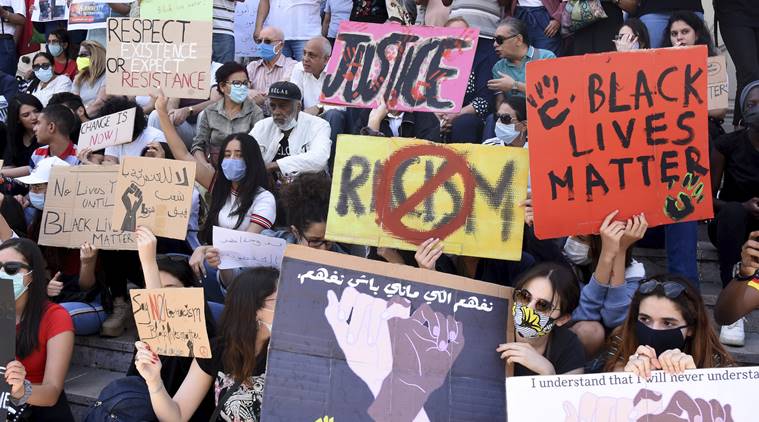 The protests which have followed the death of George Floyd, a 46-year-old black man killed by a white police officer in Minneapolis, show us clearly that the question of black emancipation is on the table as it was 60 years ago. (AP Photo/File)
The protests which have followed the death of George Floyd, a 46-year-old black man killed by a white police officer in Minneapolis, show us clearly that the question of black emancipation is on the table as it was 60 years ago. (AP Photo/File)
The protests which have followed the death of George Floyd, a 46-year-old black man killed by a white police officer in Minneapolis, show us clearly that the question of black emancipation is on the table as it was 60 years ago. Two African-American leaders, Martin Luther King Jr and Malcolm X continue to represent two different dreams for blacks in America.
King’s dream was that of a southern black middle-class Baptist priest, which became the expression of the struggle for civil rights in America and a pivotal moment of nonviolent resistance against injustice around the globe. Malcolm X, born Malcolm Little in Omaha, Nebraska, was a product of the northern poor black ghettos. Unlike King, his dream was essentially a nightmare, in which African-Americans had no chance and no hope of finding dignity and justice.
Though a believer (he converted to Islam), the seeds of Malcolm’s black nationalist sentiments were not sown in Christian or Gandhian nonviolence. He had experienced violence by the whites in his youth. Later in life, he had to go through violence in prison, where he spent several years for armed robbery. It was in prison, in early the 1950s, that he became a political activist and joined the black nationalist religious group, the Nation of Islam.
While King was getting the good education of a Baptist minister at Crozer Seminary in Chester, Pennsylvania and later as a PhD student at Boston University, Malcolm was struggling to survive in New York City’s Harlem neighbourhood, where he rose quickly in the world of crime and violence. However, as a great speaker and a talented activist, Malcolm could create, empower and sustain resilience within the black community. But he certainly lacked an ethical grammar which could explore the frontiers of a moral community. Though Malcolm cultivated the proper lifestyle of an anti-racist activist, it was King who captured the eyes and ears of white Americans around the country.
King was looking for what he called a “coalition of conscience” among Americans, which would connect white and black Christians. As such, King’s gospel of freedom became the inner church and a “thermostat” for all those who wanted to see social changes in America. But many blacks considered Malcolm X as being more radical and closer to their African roots. Unlike King, Malcolm evaluated the US as a society where no brotherhood between blacks and whites would ever be possible. “This is a society whose government doesn’t hesitate to inflict the most brutal form of punishment and oppression upon dark-skinned people all over the world,” he argued firmly.
King realised the dangers of complete separation and isolation of African-Americans from the social, political and economic life in the US.
Malcolm’s problem with King’s nonviolent philosophy was that he believed it weakened the blacks in their self-defence against the whites. In an interview with Claude Lewis in December 1964, he declared: “King himself is probably a good man, means well and all that. But the danger is that white people use King. They use King to satisfy their own fears. They blow him up. They give him power beyond his actual influence. Because they want to believe within themselves that Negroes are nonviolent and patient, and long-suffering and forgiving. White people want to believe that so bad, cause they’re so guilty. But the danger is, when they blow up King and fool themselves into thinking that Negroes are really nonviolent, and patient, and long-suffering, they’ve got a powder keg in their house.”
The fact is that Malcolm X never used violence against the whites, though he became the spiritual father of the Black Panthers after his assassination in 1965. Malcolm’s basic perspectives were Pan-Africanist combined with Third World socialism. In that sense, he was much closer to Frantz Fanon, the author of The Wretched of the Earth. Without Malcolm’s help, King and his associates might not have succeeded in passing the civil rights bills of 1964 and 1965.
Today, more than 50 years after Malcolm X’s assassination, the destiny of Black Americans remains divided between the two dreams of Malcolm X and Martin Luther King. Fifty years ago, America chose King’s dream. But today, America is once again divided between King’s American dream and Malcolm X’s African dream.
The writer is professor-vice dean and director, Mahatma Gandhi Centre for Peace, Jindal Global University